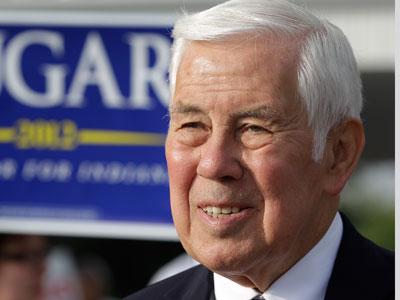May 8th primary more interesting for Dems
The series-of-oddities parade of GOP presidential contests since summer 2011 seems to be over for now, and the May 8 primary results hold some potential for improvement in government at the federal and state level. Quick spot-check below.

Sen. Lugar
Indiana:
- Most famously, Sen. Richard Lugar (R-Ind.) will leave the Senate at the end of 2012, after thirty-five years in Washington. Represented as a statesman, Lugar did not question either the Iraq war or trillion-dollar tax breaks for the wealthy under GWBush. Some Pale-Blue-Dog media commentators are spinning this as a political loss for Democrats–oddly, since the GOP senate nominee in Indiana will be State Treasurer Richard Mourdock, who filed a losing lawsuit against the Obama administration’s bailout of the auto industry. Auto parts and supplies are a significant industry in Indiana. Mourdock, a former coal and oil geologist running as an outsider, tried for Congress unsuccessfully three times in the late 1980s and early 1990s.
- Lugar’s loss to Mourdock has been represented in media almost entirely as a story of Tea-Party-wins-one. Dick Armey of FreedomWorks sent around the same line by mass email. A version of the same narrative has Lugar the statesman driven out by extreme partisanship, faulted for his votes to confirm the president’s Supreme Court nominees, for example. Lugar’s own statement takes this line. No one points out that Lugar’s Senate votes since 2006 may have made sense as political calculation also, given that Obama won Indiana in 2008. Indeed, given not only that Obama carried the state but also that Democratic party affiliation in Indiana exceeded the GOP by nine percentage points, it looks less than wizardly that Dems didn’t bother putting up a senate opponent for Lugar in 2006. Lugar ran unopposed in 2006, but can’t even win his own primary in 2012? –Q whether that’s a major sea change, or another polite major-party bargain to ignore the popular voice.
- That Lugar’s giving a false home address for decades went unremarked does not speak well either for political participation in Indiana or for national political reporting. If memory serves, Indiana was represented exclusively as a ‘red state’ in the 2008 elections, with no media reportage of the Dem party advantage in the state. Typically, that kind of thing gets reported only after Dems have lost the advantage; no media outlets reported that Dems outnumbered Repubs in Texas, either—until Gallup argued that Obama should have won even more states than he did, in the link above. The bright spot here is that the large media outlets have lost so much credibility in political reporting that most people know to get their information elsewhere.
- Democrats have shown the sense to field solid candidates in all Indiana congressional districts, contesting some held by the GOP and leaving no current GOP Reps to coast to reelection unopposed. The GOP nominees all defeated Tea Party challenges except for incumbent Marlin Stutzman in the 3rd District, a Tea Partyer himself; he is challenged by Pastor Kevin Boyd (D). Two women House nominees are Democrats, Shelli Yoder in the 9th District and Tara Nelson in Indiana’s 4th District.
- Indiana’s 5th District has State Rep. Scott Reske (D) facing GOP former U.S. Attorney Susan Brooks. The seat opened up through the retirement of Rep. Dan Burton (R). If Brooks won, she would be the first woman elected to the House by Indiana Republicans in more than fifty years. Brooks is a self-declared ‘anti-choice’ candidate linked to funding Planned Parenthood. One of the GWBush U.S. Attorneys (Southern District of Indiana) not fired, she like Mourdock is receiving heavy anti-labor support.
- Indiana’s 6th District also has a good House contest, GOP Rep. Mike Pence leaving to run for governor. Bradley T. Bookout is the Dem nominee, a strong contestant in a Republican district against a far-right ‘young gun’ GOPer, Luke Messer. Messer like Brooks has received funding from the anti-labor ‘Citizens for a Working America’, based in Virginia.
- In the governor’s race, the dubious Pence faces Dem attorney and former state house speaker John R. Gregg. Gregg also hosts an Indiana radio call-in talk show.
- Unfortunately, the Indiana state legislature is so horrendously gerrymandered that only devoted legwork from the ground up will retrieve anything. State Democrats stupidly engaged in same when they were in office, leaving a field depleted of grassroots credibility for the GOP to move in on and take over in 2010.

Renee Ellmers
North Carolina:
- Lt. Gov. Walter Dalton won the Democratic primary outright to run against GOPer Pat McCrory for governor. The North Carolina governorship has been Democratic for twenty years, although the GOP has money advantage. Top of the ticket is a boost in NC, which Barack Obama carried in 2008. Dems will have to work to keep the Pale-Blue-Dog media from torpedo-ing this one.
- The Democratic nominee for Lieutenant Governor is former Director of State Personnel Linda Coleman.
- More notoriously, of course, an anti-same-sex marriage amendment was added to the NC state constitution. Setting aside larger issues for the narrowly political assessment, this move in other states has yet to augment GOP successes in fall elections following. Nut-right victories are usually followed by general-electorate pullback, a point that has yet to be noticed in most ‘insider’ political commentary. These are not inspirational moves, and they offer nothing for most young voters.
- Weird-right GOP nominees and incumbents Virginia Foxx in North Carolina’s 5th District and Renee Ellmers in the 2nd face solid Dem challengers—Elisabeth Motsinger and retired U.S. Army Lieutenant Steve Wilkins. Foxx is on recent record criticizing people who take out student loans. Foxx, on G. Gordon Liddy’s radio show, proclaimed that she worked her way through college without borrowing—although her husband did take out some loans. No record of whether Foxx knows about the gap between 2012 college tuition and entry-level pay, or about the difference between 2012 and 1961, when she started college. While Foxx’s early self-support and commitment to her own education are laudable, it might be noted that Foxx has had what Repubs call ‘government jobs’ since 1987. That’s 25 straight years of ‘government jobs’.
- The Democratic challenger in the 10th District is NC Rep. Patricia Keever. The incumbent is another GWBush appointee, Patrick McHenry. McHenry was among other things one of Karl Rove’s men in the 2000 political campaign. He is another long-time labor-hater, having worked for Bush’s Sec. of Labor, Elaine Chao, as a Special Assistant.

Mountaintop removal in WV revisited
West Virginia:
- Obama did not carry West Virginia before, in either the primary or the general in 2008, and has little chance of doing so this time—even if the mind rejects an image of West Virginians turning out enthusiastically to vote for Mitt Romney. Sadly for it, West Virginia is not a makeweight in presidential politics, and its unimportance this primary season was highlighted by the relative success of a Texas inmate named Keith Judd as the mickey-mouse candidate who got votes. Sadly, the declining population of the state is preyed upon by vested interests. West Virginia is one of the states that most benefited from the New Deal and the Rural Electrification Administration, but any populace that sees the president as a ‘muslim’ gets little chance at a better life now.
- That said, Democratic Gov. Earl Ray Tomblin and Sen. Joe Manchin are both incumbents, and neither faces a strong challenger. Tomblin’s is conservative Republican Bill Maloney, who has no experience in public office but ran a drilling company and was involved in planning the successful rescue of the trapped Chilean miners. Manchin’s is businessman John R. Raese, who lost to him before in the campaign with the infamous ‘hick’ ad. Raese also lost elections in 1984, 1988, and 2006.
- Dems nominated two women, Robin Jean Davis and Kanawha County attorney Letitia Chafin, for seats on the West Virginia Supreme Court. Davis is also an incumbent. Reportedly the races will be expensive. The combination of low education levels and a dearth of viable newspapers means that WV, like Tennessee and Kentucky, is targeted by lobbyists against legislation and regulation in the public interest. Fertile fields.
Wisconsin:
- Democrats rebuffed ham-handed efforts to sabotage the recalls of Gov. Scott Walkers and others, electing genuine nominees over fakes.
- Democrats elected Tom Barrett and Mahlon Mitchell for the gubernatorial recall election, a strong ticket. The Wall Street Journal is writing up the primary as a loss for labor—disregarding the fact that a historic recall is happening in the first place because of labor and public support for labor. Sour grapes.
More later
